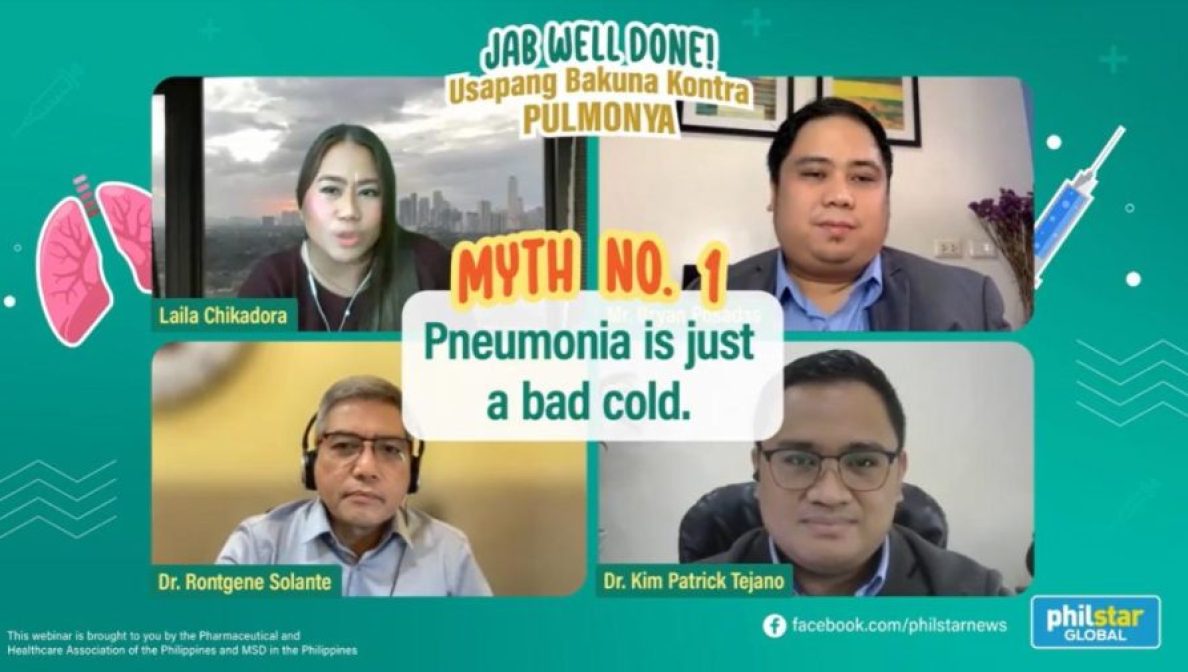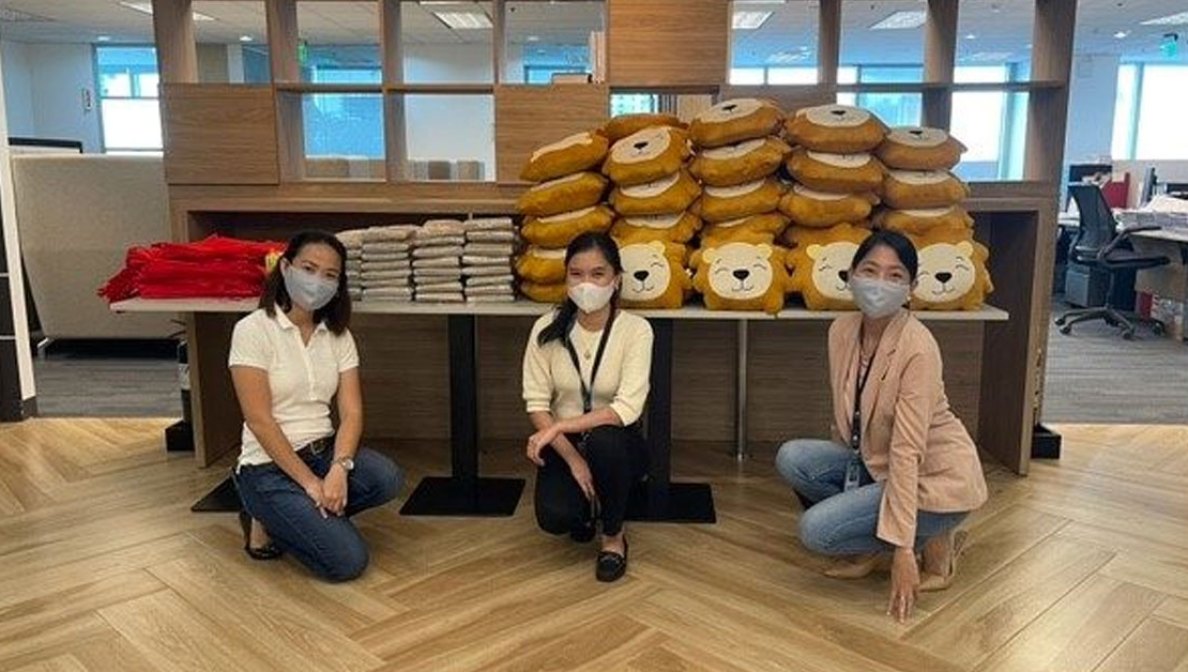In line with its commitment to educate the general public about the importance of immunization against pneumonia, MSD in the Philippines, together with the Pharmaceutical and Healthcare Association of the Philippines (PHAP) and Philstar.com, organized a webinar on the importance of pneumonia vaccination titled Jab Well Done! Usapang Bakuna Kontra Pulmonya last July 29.
In this webinar, a panel of experts joined forces to bust long-standing myths about pneumonia prevention and immunization.
“We use our lungs every day. We cannot breathe and we cannot exist without our lungs,” says Dr. Rontgene Solante, one of the leading specialists in vaccination and adult infectious diseases in the country. No wonder one of the leading causes of death worldwide primarily impacts our lungs—pneumonia.
Pneumonia is a leading cause of death and hospitalization among the elderly and in people living with long-term chronic diseases. In the Philippines alone, pneumonia was the seventh leading cause of death in 2021.
Pneumonia also tops the list of illnesses that the Philippine Health Insurance Corporation (PhilHealth) processes claims and reimbursements annually, added Solante, who is also the head of the Adult Infectious Diseases and Tropical Medicine Unit of San Lazaro Hospital and a member of the Vaccine Expert Panel of the Department of Health (DOH).
“While pneumonia is among the leading causes of death, it is also a vaccine-preventable disease,” Bryan Posadas, national program manager of the Pharmacy-Based Immunization Program of the Philippine Pharmacists Association (PPhA), shared.
COVID-19 and pneumonia are often referred to as the “deadly duo,” as COVID-19 is now a primary risk factor for pneumococcal pneumonia and invasive pneumococcal disease. As such, pneumococcal vaccination during the COVID-19 pandemic has become more critical than ever.
Vaccination is one of the most vital and cost-effective tools available in health care to help prevent infectious diseases like pneumonia. However, vaccine awareness and availability do not immediately translate to immunization, explained Dr. Kim Patrick Tejano, program manager of the National Immunization Program (NIP) of the DOH.

Addressing pneumonia myths
Myth 1: Pneumonia is just a bad cold
No, pneumonia is not just a bad cold, explained Solante. Colds are an infection of the upper respiratory tract and are usually manageable. Pneumonia, on the other hand, is an infection of the lower respiratory tract that inflames the lungs and air sacs (alveoli).
When inflamed, the air sacs may fill up with fluid or pus, causing symptoms such as cough, fever, chills and trouble breathing. Unlike colds, pneumonia is life-threatening, causing complications such as respiratory failure, sepsis, and lung abscess.
Myth 2: You get pneumonia from dried sweat and overfatigue
No, you cannot get pneumonia from dried sweat and overfatigue, explained Tejano. As explained earlier, pneumonia is a swelling or an inflammation in one or both lungs usually caused by an infection.
Different germs can cause pneumonia, including bacteria, fungi and viruses, including influenza and the COVID-19 virus. The most common cause of bacterial pneumonia is Streptococcus pneumoniae, followed by the bacteria-like organism, Mycoplasma pneumoniae.
Myth 3: Pneumonia only affects the elderly
Pneumonia can affect people of any age, explains Solante. However, pneumonia is more likely to affect and have serious complications for infants and young children, people 50 years old and above, people with weakened immune systems, and adults with other chronic medical conditions.
Regardless of age, one is also more likely to get pneumonia if they have diabetes, asthma, chronic obstructive pulmonary disease (COPD), or heart disease. Smokers and heavy drinkers are also at high risk of getting pneumonia. These vulnerable groups are recommended to get their pneumococcal vaccine.
Myth 4: You only need one pneumonia vaccine in your lifetime
Much like with the COVID-19 vaccine, you need more than one shot of the pneumonia vaccine, explained Posadas. According to the Philippine Society for Microbiology and Infectious Diseases (PSMID), pneumococcal polysaccharide vaccine (PPSV) or pneumococcal conjugate vaccine (PCV) are recommended for the prevention of invasive pneumococcal disease in adults 50 years old and older.
The current PSMID adult immunization guidelines recommend two pneumococcal vaccines, given in a sequential approach. The vaccines are usually given 1 year apart or 8 weeks for those who are immunocompromised.
Myth 5: COVID-19 vaccines can protect me against pneumonia
While the COVID-19 vaccine can help protect one from the severe symptoms of the coronavirus, it does not guarantee protection from pneumonia. Specific vaccines protect against specific kinds of diseases and infections; as such, the COVID-19 vaccine can only protect you from COVID-19, explained Solante.
As stated, COVID-19 is now regarded as a key risk factor for pneumococcal pneumonia and invasive pneumococcal disease. As such, it is recommended that high-risk individuals get their pneumococcal vaccine as soon as possible.
Immunizing pharmacists in action
Despite vaccines being readily available, safe and effective, vaccine hesitancy remains. As such, we need the continued cooperation and collaboration of allied medical and health professionals to ramp up vaccine awareness and immunization, especially among the most vulnerable members of the population.
Pharmacists have been identified by the public as among the most accessible health care professionals as well as a trustworthy source of health information.
During the COVID-19 pandemic, pharmacists helped fast-track COVID-19 vaccination through the ResBakuna sa Botika Program, a joint government and private sector initiative that aims to expand the country’s immunization program.
Through this program, pharmacists embraced their role as adult immunizers to help address the shortage of vaccinators. Adult vaccines, such as pneumococcal vaccines and flu shots, are made available in local pharmacies and drugstore chains nationwide and can now be administered by pharmacists.
The PPhA provides a training and certification program for immunizing pharmacists, where they undergo theoretical learning, skills training and basic life support before they can be certified to administer adult vaccines.
Today, there are around 1,000 trained and certified immunizing pharmacists in local pharmacies and drugstore chains nationwide and there are more in the pipeline, Posadas shared.
“Get correct information from trusted health care professionals, including pharmacists. Trust the experts. Vaccination is another layer of protection,” he said.
“We strongly encourage everyone to get their age-appropriate vaccines to protect themselves and the people around them from vaccine-preventable diseases like pneumonia. All you need to do is visit the nearest health center to know the available vaccines and schedules. Let’s all get vaccinated for a healthier Philippines,” Tejano concluded.
This article has been originally published on Philstar.com.












